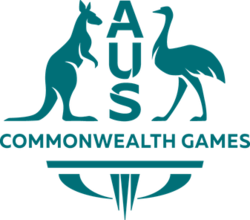Commonwealth Games Australia
Commonwealth Games Australia (CGA), formerly Australian Commonwealth Games Association (ACGA), is the Commonwealth Games Association for Australia. It represents the Commonwealth Games movement and organises the participation of athletes at the Commonwealth Games and Commonwealth Youth Games. The 2018 Commonwealth Games on the Gold Coast, Queensland were held under aegis of the CGA.
 | |
| Abbreviation | CGA |
|---|---|
| Predecessor | Australian Commonwealth Games Association |
| Headquarters | Melbourne, Victoria, Australia |
| Location | |
Patron in Chief | His Excellency General the Honourable David Hurley AC DSC (Retd) (Governor General of the Commonwealth of Australia) |
Patron | Scott Morrison (Prime Minister of Australia) |
President | Ben Houston |
| Website | Official Website |
Role
| Part of a series on |
The CGA is one of 71 Commonwealth Games Associations currently recognised by the Commonwealth Games Federation (CGF).
Working with the national governing bodies of each sport, the CGA selects Team Australia's members to compete in all sports at the Commonwealth Games and Commonwealth Youth Games. The CGA is independent and receives no funding from the government. Its income comes from fundraising and events.[1]
Governance
| Name[2] | Designation |
|---|---|
| His Excellency General the Honourable David Hurley AC DSC (Retd) (Governor General of the Commonwealth of Australia) | Patron in Chief |
| Scott Morrison (Prime Minister of Australia) | Patron |
| Ben Houston | President |
| Leeanne Grantham | Vice President |
| Craig Phillips | CEO |
Predecessor
The ACGA was originally the national body responsible for Commonwealth Games operations, publicity and development in Australia, specifically providing and organising funding, clothing, travel, accommodation and accreditation of athletes and officials to each Commonwealth Games. The ACGA is both an incorporated association and a non-profit organisation.
The ACGA was involved in the organisation of the 2004 Commonwealth Youth Games, which were held in the Australian city of Bendigo.
Aims
The main functions of the CGA are to:
- Promote the ideals of the Commonwealth Games throughout Australia;
- Prepare athletes for the Games by providing support such as funding for international competition;
- Select athletes, coaches, managers, medical personnel and officials to be included in the Australian Team at the Games;
- Coordinate and manage the participation of Program Sports and their respective athletes and officials at the Commonwealth Games;
- Contribute to the development of Australia's high performance junior athletes through the Australian Junior Commonwealth Games Squad Program (AJCGS), and through participation in the Commonwealth Youth Games.
History
Australia has won the medal tally at 13 Commonwealth games.
Australia first competed at the Games, then titled the British Empire Games, in 1930; and is one of only six countries to have sent athletes to every Commonwealth Games. The others are Canada, England, New Zealand, Scotland, and Wales.
Six of the 21 games have been hosted by Australia, with the city of Gold Coast hosting the 2018 Commonwealth Games.
Australia has placed first at 13 out of the 21 games (compared with England 7 and Canada 1) and has been in the top three for all meets except the first games in 1930.
After the 2006 Games, Australia was first in the all-time medal tally.
In all but one of the 18 Commonwealth Games held so far (excluding the 1978 Games), the Australian flag bearer has gone on to win a gold medal.[3]
Games Staged
Australia has hosted the Commonwealth Games on four occasions but have only won once via an international vote. That vote was for the host of the 2018 games, won by the Gold Coast.
Sydney 1938 was simply awarded.
Perth 1962 was a contest between Adelaide and Perth which Adelaide originally won at the 1956 Summer Olympics in Melbourne, Australia. Adelaide first won 13 votes to Perth's 3. Two years later that was overturned by the Australian Commonwealth Games Association prior to the 1958 British Empire Games in Cardiff, Wales. A New Vote awarded Perth with a 9 to 7 vote.
Brisbane 1982 was awarded after Lagos, Nigeria; Kuala Lumpur, Malaysia and Birmingham, England all withdrew prior to the Bid vote that took place in Montreal, Quebec, Canada during the 1976 Summer Olympics.
Melbourne 2006 was awarded to the city after Wellington, New Zealand withdrew their bid prior to the Bid Lodgement Deadline.
| Year | Host City, State | Years Between |
| 2018 Commonwealth Games | Gold Coast, Queensland | 12 |
| 2006 Commonwealth Games | Melbourne, Victoria | 24 |
| 1982 Commonwealth Games | Brisbane, Queensland | 20 |
| 1962 British Empire and Commonwealth Games | Perth, Western Australia | 24 |
| 1938 British Empire Games | Sydney, New South Wales | - |
Failed bid Results
| Year | Australian Candidate City | Winning City | Vote Tally |
| 1974 Commonwealth Games | Melbourne | Christchurch | 2-36 |
| 1998 Commonwealth Games | Adelaide | Kuala Lumpur | 25-40 |
See also
- Australia at the Commonwealth Games
- Australian Olympic Committee
- Australian Paralympic Committee
See also
- Australia at the Commonwealth Games
- Australian Olympic Committee
- Australian Paralympic Committee
- List of Commonwealth Games competitors for Australia
References
- "About Commonwealth Games Australia Association". Commonwealth Games Australia. Retrieved 2017-09-29.
- "Governance of Commonwealth Games Australia Association". Commonwealth Games Australia. Retrieved 2017-09-28.
- "Saville to carry Commonwealth Games flag". Archived from the original on 2007-03-30. Retrieved 2006-03-30.CS1 maint: BOT: original-url status unknown (link)